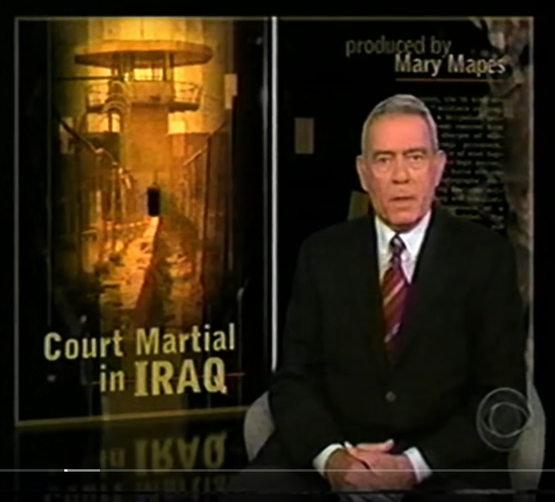In the spring of 2004, 60 Minutes II broke the story of Abu Ghraib with a piece called "Court Martial in Iraq." Dana Roberson recalls how it all started with a phone call from a military contact she had maintained over the years. They talked about abuse of Iraqi prisoners and about the existence of photographs. Following standard journalistic rules, producers Roberson and Mary Mapes traveled to Kuwait to talk to a dozen of sources and carefully confirmed the validity and veracity of the pictures. The story then went through the usual process of being pieced together and prepared for broadcasting, with Dan Rather playing an essential role in the interviews.
As the team was getting the story ready, CBS received phone calls from the Pentagon asking them to delay the broadcast in order to not jeopardize American operations and the lives of soldiers and of hostages that had been recently captured by insurgents. CBS agreed, causing a lot of tension among the journalists involved as they thought the story had to be told.
The story finally aired on April 28, 2004, triggering global reactions, including outrage at what had happened as well as criticism directed at CBS for having held the story for two weeks. Six enlisted soldiers were being prosecuted in the spring of 2004 and some, including the family of Chip Frederick, who had reached out to the military and the federal government before contacting the media, argued they were being scapegoated for a failure of the army's leadership.
In 2005, the segment was honored with a Society of Professional Journalists Excellence Award as well as a Peabody Award with the following comments: "The truism that television is a visual medium was confirmed in this report. But here the visual component consisted primarily of a set of still photographs that shocked viewers throughout the world and raised questions that are in many instances still open. Preparation of the report began long before it was aired. Details were checked. A court martial investigation was in process prior to the presentation of the report. 60 Minutes II became the first news organization to gain access to the Taguba Report and other documents that included names of civilian contractors at the infamous prison as well as statements detailing their interrogation techniques. In the report military officials acknowledge the unconscionable behavior of the few who engaged in illegal and morally intolerable practices at Abu Ghraib. Executive producer Jeff Fager, executive editor Patti Hassler, senior broadcast producer Michael Whitney, with producers Mary Mapes and Dana Roberson, associate producer Roger Charles and reporter Dan Rather, provided the viewing public with a truly significant report that revealed one aspect of the terrors of war. For a straightforward examination of an unwelcome and frightening aspect of the war in Iraq, a Peabody goes to 60 Minutes II: Abuse at Abu Ghraib."


